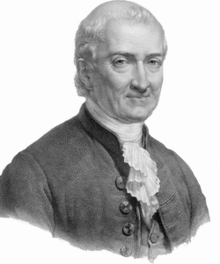François Barthélemy
François Barthélemy (since 1808 Comte de , since 1815 Marquis de ) (born October 20, 1747 in Aubagne , † April 3, 1830 in Paris ) was a French diplomat and politician. He was in the first republic temporarily member of the Board . Later he was Vice President of the Senate under Napoleon Bonaparte and under Louis XVIII. Minister of State and member of the Chamber of Pairs .
Life
François Barthélemy was a nephew of the author and archaeologist Jean-Jacques Barthélemy , who also contributed to his upbringing. Through this he got a post in the diplomatic service in 1768. After the beginning of the French Revolution , he became Chargé d'Affaires in London . In 1791 he took over the legation in Switzerland as an authorized minister . The anti-revolutionary mood in Solothurn caused him to dissolve the local legation and move to Baden . Despite the breaking off of diplomatic relations by the Diet , he stayed in Switzerland. He was involved in the National Convention recognizing Switzerland's neutrality in 1793. He postponed the annexation of Geneva . On the other hand, he took care of supplies from Switzerland for the French army. He was now officially accredited again in Switzerland and in 1795 played a key role in the conclusion of the Treaty of Basel with Prussia , Spain and the Landgraviate of Hessen-Kassel . However, a peace agreement with Great Britain failed.
After the elections of February 25, 1797, which resulted in a great success for the royalists, he was elected to the board of directors on May 26, 1797 by the council of elders . Like Lazare Carnot, he stood for a moderate course with certain monarchist tendencies. He was overthrown by the coup d'état of the 18th Fructidor V (September 4, 1797), which the republican forces in the board of directors brought against the growing right. He was arrested and taken to French Guiana . He managed to escape to the United States and from there to Great Britain.
After the coup d'état of 18th Brumaire VIII (November 9, 1799) Napoleon called him back to France. This made him a member of the Senate in 1800. He was also appointed commander of the Legion of Honor . In 1802, Barthélemy was at the head of the Senate embassy, which Napoleon proposed to be consulate for life. Politically, however, it hardly played a role anymore. As emperor, Napoleon made him count in 1808.
After Napoleon's defeat in the Wars of Liberation , as Vice President of the Senate in April 1814, he chaired the Senate, which decided to depose Napoleon. After the restoration , Louis XVIII appointed him. as Peer of France and Grand Officer of the Legion of Honor. He was a member of the body that drafted the Charte constitutionnelle . During the reign of the hundred days , Napoleon removed him from the list of pairs. After the renewed Restoration in 1815, he was appointed Minister of State and made Marquis. As a member of the Chamber of Pairs, he made himself unpopular in 1819 when he applied to restrict the right to vote in favor of the ultra-royalists. Thereupon he withdrew into private life.
Web links
- André Schluchter : François de Barthélemy. In: Historical Lexicon of Switzerland .
- Entry in archontology.org
- François Barthélemy . In: Brockhaus Konversations-Lexikon 1894–1896, Volume 2, p. 443.
| personal data | |
|---|---|
| SURNAME | Barthélemy, François |
| BRIEF DESCRIPTION | French diplomat and politician |
| DATE OF BIRTH | October 20, 1747 |
| PLACE OF BIRTH | Aubagne |
| DATE OF DEATH | April 3, 1830 |
| Place of death | Paris |
